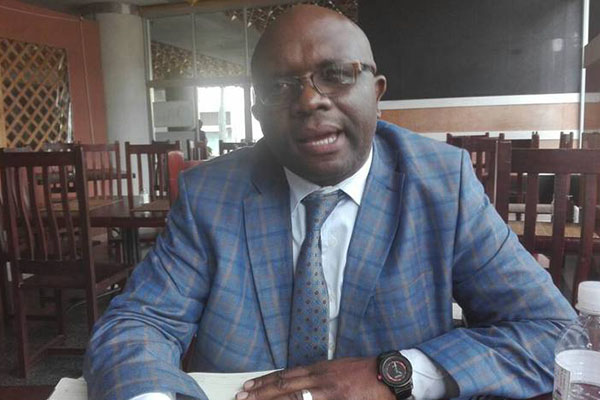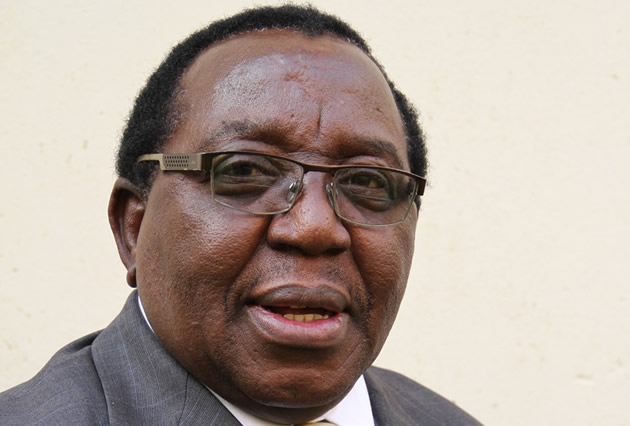‘Ministers have let the indigenisation drive down’

THE INTERVIEW Tichaona Zindoga
Hard questions have lately been asked of the trajectory of Government’s indigenisation policy, which ironically informed the winning manifesto of the ruling zanu-pf party in 2013. The issue has in the past two or so years slipped under the radar, but analysts say there is much still needed to be done regarding putting the economy of Zimbabwe into the hands of majority blacks. An expert, Mr Langton Mabhanga (LM) who is an advisory member of the South Africa-based Pan-African Chamber of Commerce and President of the National Business Council of Zimbabwe (NBCZ), lays the blame squarely on ministers for failing to implement the vision of President Mugabe across various sectors. He speaks to The Herald Political Editor, Tichaona Zindoga (TZ).
TZ: Indigenisation has somewhat paled in significance on the national mind in the past two or so years considering it was a big electoral issue just recently in 2013. Can you locate indigenisation in 2017 for us and what trajectory it is taking?
LM: Firstly, it has to be conceded by all that the Indigenisation and Economic Empowerment policy is a gem of a policy that will forever be the legacy of President Mugabe.
It is so sad and frustrating that today there has been glaring ineptness in policy uptake of the indigenisation and economic empowerment policy. You can see the heart of the President bleeding, you can see his anxiety; you can see the disconnection between the vision of the President and the off-take of the policy.
It is also sad that we had to get to a point where there was so much ugly and noisy disjuncture between members of the same Cabinet serving under the same appointing authority over the Indigenisation and Empowerment policy.
This was when the President himself had to clarify the policy context, the policy texture, the policy scope and the policy spirit of the Indigenisation and Economic Empowerment Act. Sadly, there has been no single follow-through action, by the Cabinet on what the President explained on.
It is pathetic that since that clarification, Zimbabwe’s reserved sector areas remain violated, they remain infringed by foreigners. It is sad that even properties on Zimbabwean soil, Zimbabwean businesses are made to be second class in their own country, by violators of that policy, the indigenisation and empowerment policy.
It is sad that our own artisanal black miners are being chased and bitten by dogs: chased away from the pits yet foreigners on a Visitor’s (Immigration) Permit are making entry into the country and walking straight into mines offices into EMA (Environmental Management Authority) offices and getting permits to exploit our own resources.
Which country under the sun do you fly into today and go straight to dig the endowments, extract them and trunk them out and leave the country? Which country is that besides Zimbabwe?
It is sad that with all the ammunition of the Indigenisation and Economic Empowerment Act, we still have those perforations. It is sad that calamities of the Marange villagers remain stinking, open wounds bleeding.
We left foreigners coming in to the diamond endowed areas, extract diamonds and dislodge settlements of the Marange people including their schools. Villagers have been left in substandard housing units. They have been left with inadequate learning facilities and diamonds have been extracted from the country with no value for them in their own country, 37 years after Independence.
It is sad that the black farmers who have taken to sugar cane farming in the Lowveld are being exploited. Their sweat is not being compensated adequately by Tongaat. All these things are happening in full daylight where we are supposed to see the gains of the Indigenisation and Economic Empowerment Act.
The irony of it is that the opposite of what this policy ought to have stopped is happening. It is time now and today that we really begin to put across this narrative in the spirit and letter of the vision of this country.
The line ministers are responsible. Thirty-seven years on we are still riding on 1954 legislation. The Gold Act (Section 3), a 1954 Act meant and driven by the colonisers of this country to side-step and marginalise blacks from access to any mineral of value, is what we are still riding on.
How do we continue to negate our own? How do we continue to favour to advance the interests of the mining houses that hail from the very countries that colonised us? We cannot be seen to protect those international mining houses.
And for once, can anyone today explain to us, the strategic benefit, the strategic yield that a simple and ordinary Zimbabwean is yielding from the international mining houses that are digging our country at this point? All they do is leave holes in this country.
It is time that the real ownership of resources and endowments is reconfigured to align with the Indigenisation and Economic Empowerment Act.
TZ: But there seems to be no real appetite as of 2017 to pursue such fundamentalist position. What would you attribute that to?
LM: We do have those that are delegated with the responsibility to implement and roll out policy who are now preoccupied by successionist politics and some preoccupied by self-aggrandisement and not being driven by national interest.
A number of things are not putting to the fore national interest. And by the way the indictment is not on His Excellency, he is the appointing authority and has delegated.
It is the obligation of those appointed to take on their responsibilities with due ownership, enthusiasm, focus and depth as that of their appointing authority.
TZ: But you are part of the civil society and empowerment lobby, as NBCZ, and you are also a player in the business sector. What have you done to lobby towards a refocus or a realignment with the vision or otherwise the pursuit of the goals of Indigenisation and Economic Empowerment?
LM: We have been quite seized with those matters. For your own information we have provided some thought leadership and led national discourse on matters relating to the current challenges of the cash crisis.
We have been lobbying a lot, we have lobbied Parliament on both sides and the height of it was when we made presentations to the Zanu-PF Parliamentary caucus at the party headquarters which was chaired by the Chief Whip Honourable Lovemore Matuke. It was attended by Cabinet ministers and Members of Parliament.
We were leading conversations and discourse on the National Competitiveness Commission Bill. You may want to know that we have made our contribution in a sizeable way to try and redefine the direction and issues and put it across to those who are seized with crafting policies in the august House of Parliament to focus on generating rational, robust and relevant policies.
They also need to raise the level of game. Indeed, it goes without saying that the level of play in the Eighth Parliament of Zimbabwe leaves a lot to be desired. The level, scope and depth of debate, really leaves a lot to be desired.
We are trying to impress on them that their responsibility is to occupy the legislative role aptly; to occupy the oversight role aptly. It is so important that they carry out those roles in a real meaningful way.
We have seen space in that to try and set some fire under their seats for them to see their responsibility in a much broader way. Also, there hasn’t been much recognition or collaboration between Arms of Government especially the Legislature, with the business sector.
We have also found some overarching incidents where Government tries to occupy some role as a business entity. Government is not a business entity. Government’s brief is to make sound policies, create a correct operating environment for business and support business. They play a facilitating role for business.
As an example, which we got first hand from the president of Turkey, His Excellency president Erdogan, he said, at one of the summits we attended in Istanbul, that the biggest entourage of all his foreign trips is actually business not political.
He said while he is in his political halls, businessmen are busy cutting deals for the good of Turkey and Turkish capital. We need to recognise that. Good business provides for good politics. So politicians can be successful politicians in their sphere if they create an environment for successful business.
TZ: Just to take you back, you touched on the reserve sectors and spoke passionately about the mining sector and the issues surrounding indigenisation. But we also have the recent issue of Barclays Bank which has spawned a lot of debate. What are your thoughts around the Barclays Bank saga vis-a-vis indigenisation?
LM: We have raised specific issues on the Barclays deal vis-a-vis its opaqueness and we have approached National Indigenisation and Economic Empowerment Board and will be writing to the line Ministry, the Ministry of Finance. It is imperative that the Barclays Bank issue is unpacked.
It is of national interest, it is demanded forthwith that the Barclays deal is unpacked, explained to the content of indigenous investors and due processes thereof need to be explained. We need to set precedence. We cannot continue to do things in a wrong way.
Barclays Zimbabwe was quite an endeared outfit for Barclays International which is why it was never part of Barclays Africa. Therefore, its seizure has to be explained and unpacked and it must pass all tests of national interest.
TZ: But some would quickly say that it’s just a reflection that indigenisation has failed. Would you agree with that?
LM: I would agree with that because had our arteries been working, all detection would have been active throughout. I will agree with you. It was intriguing that even the supervising fiscal authority in the country claimed ignorance about the details of the deal even on the eve of the deal being confirmed.
It erupted in the country one day that there was a potential deal and in a matter of 48 hours the deal was confirmed. It also shows you how sinister and shrouded that process was and the opaqueness of it.
TZ: It brings us to the issue of foreign direct investment, many have seen the push for indigenisation as anathema to FDI. Can you explain whether FDI and indigenisation can co-exist?
LM: The correct premise to place indigenisation relating to FDI is that indigenisation is seeking to appropriate endowments to indigenous people. This is the guiding principle in every sovereign nation. It is sad that a number of people are being hoodwinked that the guiding principle is only negotiable in Zimbabwe. Natives should own their resources that does not shut the door. Instead, it creates demand.
Imagine if we went now and placed our economically active young talents and young professionals in the various spheres and domains then we open borders and urge investors to come so that they find their matching partners. You can imagine the multiplying effect that will have on the GDP. So indigenisation is not chasing away FDI, in fact it is creating demand for FDI. It’s very important that we advance that narrative as a philosophy.
We need to come up with business models that work for the pick and shovel miners we would have put out there, the young people that we give land. It must not just be giving land for the sake of it and the President aptly said that “we can’t just give you land, you need inputs where do you get the inputs from?”
He is really lifting the bar up to say we are moving into a business world. Land is a business commodity, mining is a business commodity and we need corresponding business model that support that.
On the farming side, let’s have business models. For example, the Kibbutz system where we put our young people under apprenticeship in land supervised. They are trained, they are supported and they have to reach a certain mark and score for them to deserve ownership of the land. Purely measured and marked on the basis of the performance of their production.
If we did that, we would be creating a dimension of command agriculture that is pro-young people which keeps young people into some incubation processes. Where does that lead us to? It creates demand for the manufacturing sector. What does it mean to create demand for the manufacturing sector? We are going to be importing those machines. That necessity is creating demand for FDI.
It’s sinister for anyone on this space to try and insinuate that indigenisation is an enemy to FDI. The contrary is true, we need urgent and radical transformation. We need to be very radical in terms of stepping up indigenisation and economic empowerment.
TZ: Many unemployed young people and college graduates have been expecting to see jobs tumbling out of some mill and the indigenisation programme has not been able to be that mill that churns out jobs. What do you say must be done to see the palpable creation of jobs that are being demanded by so many young people out there?
LM: It should be quite clear that the state and level in which our economy is in at the moment, indicate that our economy will be turned around and in stages. The point of departure for the turning around of the economy is primary production. We have to produce first. In that layer, not everyone is going to be absorbed. But within that layer, I can rest assure you that 2,2 million jobs is an understatement, more can be absorbed. If we create robust business models in agriculture, mining, tourism because those are the areas that we have comparative advantage as an economy, it will of necessity dictate even a broader layer that will be the manufacturing layer. The manufacturing layer will come with industrialisation.
I am sure you know that the Agenda 2063 of the African Union speaks to that. That layer will absorb another level of skill, another level of talent and another level of capital. There are synergies right through that chain. The value chains of the various production. Commodities will again have their own absorption effect that will take young people on.
The focus is that we put together business models for each layer. Mind you when we even get to the layer of industrialisation, we are not talking of the high rising furnaces burning out steam. The Asian Tigers did not industrialise on high rising chimneys; they industrialised on the basis of compact, agile machinery even at village level. What they produced they could value add at village level. All they ensured was that they had sound policies, management systems and business models as well as support systems. Asian Tigers lifted themselves from the dust of deserts to robust, high performance, high income economies in a single generation.
TZ: In light of what we have discussed what would you say is the urgent national question. What would say is the turning point?
LM: I would say the urgent and imperative entry point is that we converge a national think tank that comes up as a matter of urgency with business models for various interventions; mining, agriculture and tourism. We are looking at the sustainability of our interventions. We are building and constructing sustained interventions.
Secondly, we are ensuring a rapid yield of indigenisation of the economic empowerment act which will seek to empower our young talents, entrepreneurs, professionals. I can assure you that even the economic woes that are infuriating the public will subside. We need a rewriting the narrative to say it can be done by Zimbabweans in Zimbabwe and for Zimbabwe.









Comments